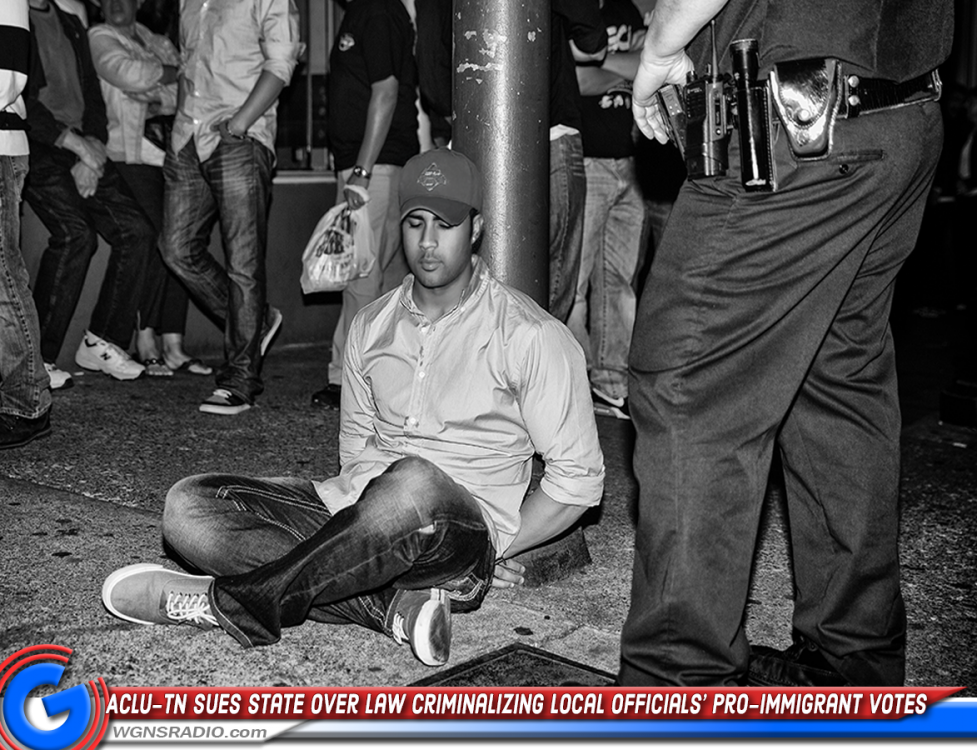NASHVILLE, Tenn. – The American Civil Liberties Union of Tennessee filed a lawsuit Wednesday challenging a new state law that criminalizes local officials for voting in favor of pro-immigrant policies. The law, passed earlier this year, makes it a felony — punishable by 1 to 6 years in prison — for officials to support so-called “sanctuary” policies that conflict with state immigration enforcement directives.
The lawsuit was filed in Davidson County Chancery Court on behalf of seven Nashville Metro Council members, including several from the Council’s Immigrant Caucus. The plaintiffs argue the law violates their First Amendment rights and undermines local democracy.
ACLU-TN Legal Director Stella Yarbrough called the law “an extreme, unconstitutional attack on the legislative process,” while co-counsel Jeff Preptit said it criminalizes elected officials for representing the will of their constituents.
Nashville Metro Council members say the law creates fear and legal uncertainty, especially for leaders serving immigrant communities. The ACLU is urging the court to block enforcement of the statute. Scroll down for more details.
About SB 6002, Immigration - As enacted, creates within the department of safety the centralized immigration enforcement division, to be administered by the chief immigration enforcement officer; establishes a grant program to promote the enforcement of federal immigration laws; creates criminal penalties for officials who adopt sanctuary policies and subsequently requires their removal from office upon conviction; requires the department of safety to issue lawful permanent residents a temporary driver license, instead of a standard license, to aid in determining voter eligibility; makes related changes. - Amends TCA Title 2; Title 4; Title 5; Title 6; Title 7; Title 8 and Title 55.
SB6002 has been assigned Public Chapter Number 1 by the Secretary of State.
Parts of the law take effect immediately. Other parts, including penalties for officials and new driver license rules, begin in July 2025 or January 2026. As of now, The immigration enforcement division and grant program will expire in January 2029 unless renewed by the legislature.
Key Points of the Law:
-
New State Division: A new centralized immigration division will oversee how local and state law enforcement work with federal immigration agencies.
-
Chief Immigration Officer: The CIEO will help enforce immigration laws, create enforcement plans, manage resources, report to the governor, and make sure cities and counties follow immigration laws.
-
287(g) Program: The state and local police are encouraged to join a federal program (called 287(g)) that lets them help enforce federal immigration laws, including arrests and deportations.
-
Grants to Local Governments: Cities and counties can get state money to support their participation in immigration enforcement, like training, equipment, or operating costs. These funds come from a new state fund created just for immigration enforcement.
-
Reporting Requirements: Any local government that gets grant money must submit quarterly reports showing how the funds were used and whether they were effective.
-
Criminal Charges for Officials: Local elected officials who vote in favor of "sanctuary" policies — which limit cooperation with federal immigration authorities — can face Class E felony charges (punishable by 1–6 years in prison) and be removed from office.
-
Changes to IDs and Driver’s Licenses:
-
Only U.S. citizens can get a regular Tennessee driver’s license.
-
Non-citizens with legal status may get a temporary license, which must look visually different from a citizen’s license and cannot be used for voting.
-
People applying for licenses must show proof of U.S. citizenship.
-
Even lawful permanent residents must show proof of U.S. citizenship to renew or keep a regular license after 2026.
-
-
COST: For the fiscal year of 2025 to 2026, the new law will cost taxpayers $5.5-million, which has been funded from the general fund within the state. For the fiscal year of 2026 to 2027, the added cost will equal another $500-thousand, bringing the total up to $6-million.
FULL RELEASE FROM THE ACLU – The American Civil Liberties Union of Tennessee filed a lawsuit today challenging Tennessee’s newly enacted law that violates the First Amendment rights of locally elected officials voting in favor of policies supporting immigrants. This law is an unprecedented effort to criminalize legislative speech, debate and deliberation. The lawsuit was filed on behalf of 7 members of the Nashville Metropolitan Council, including members of the Council’s Immigrant Caucus, who could face felony charges simply for casting votes in favor of policies intended to support Tennessee’s immigrant communities.
In enacting this law, Tennessee went beyond every other state in the nation by imposing felony criminal liability, including the possibility of 1 to 6 years of imprisonment, for local officials who adopt, enact or even vote for policies that conflict with the state’s mandated views on immigration enforcement. By making it a class E felony for local officials to vote in favor of vaguely defined “sanctuary policies,” the state is effectively punishing officials for doing their jobs and responding to the needs of their constituents.
“This law is an extreme, unconstitutional attack on the legislative process and democracy as a whole,” said Stella Yarbrough, ACLU-TN legal director. “Our local officials are elected to vote in ways that support their constituents. This overly broad, ill-defined law sets a dangerous precedent of state overreach and political retribution against elected officials simply for trying to do their jobs. We had no choice but to file this lawsuit – democracy itself is on the line.”
Plaintiffs in this lawsuit include Nashville Metropolitan Council members Clay Capp, Brenda Gadd, Delishia D. Porterfield, Sandra Sepulveda, Zulfat Suara, Terry Vo and Ginny Welsch.
"This legislation makes it a felony for local leaders to do the job our communities elected them to do,” said co-counsel Jeff Preptit of Herzfeld, Suetholz, Gastel, Leniski and Wall PLLC. “Local leaders shouldn’t face criminal charges for passing policies that reflect the values and safety concerns of our neighbors — especially when those policies ensure trust between residents and local government.”
The lawsuit was filed in the Chancery Court for Davidson County. In addition to Yarbrough and Preptit, the plaintiffs are also represented by Ben Gastel of HSGLaW.
The plaintiffs shared the following statements:
Clay Capp, District 6 Council Member: “Free speech and debate are how I learn from the people I represent, and it’s how I advocate for them. That is the essence of representative government. But for the first time in American history, a state is attempting to criminalize local officials who don’t vote the way the state wants them to. Everyone who loves freedom should be alarmed by that. In America, we have free speech, and it’s not a crime to disagree with the government.”
Brenda Gadd, District 24 Council Member: “Local elected officials have a constitutional right to make decisions that reflect the needs and values of their communities—without fear of criminal prosecution. Public Chapter No. 1 is not just an attack on immigrants; it’s an attack on local democracy and the officials elected to uphold it.”
Delishia D. Porterfield, Council Member At Large: “Immigration enforcement is a federal issue — not something local governments are equipped or trained to handle. This law blurs those lines and creates legal minefields for local officials simply doing their jobs of serving their community. It’s bad policy and even worse governance.”
Sandra Sepulveda, District 30 Council Member: “We as local leaders work hard to build bridges between residents and government, especially in immigrant communities, like my own, where trust is fragile. This legislation tears down those bridges by threatening officials who stand up for policies that keep all of us safer. That’s not just wrong — it’s dangerous.”
Zulfat Suara, Council Member At Large: “This law infringes on the constitutional protections I have as a legislator: to do what is best for my constituents without fear of interference. We must not allow the state to usurp these protections. As a public official and an immigrant, I cannot accept a law that makes compassion a crime. Many immigrant families already live in fear – if they come after immigrants, who will they come for next?”
Terry Vo, District 17 Council Member: “Criminalizing local officials for trying to protect their constituents is a direct attack on communities of color. This legislation forces us to choose between doing what’s right for the people we serve or facing felony charges — and that’s not a choice anyone in a democracy should be forced to make.”
Ginny Welsch, District 16 Council Member: “It’s the job of an elected official to pursue policies that both protect our constituents, and build trust, and this legislation does the exact opposite. It undermines local leadership and trust and basically says that standing up for the whole of our city is somehow wrong and deserving of punishment, even jail time. That’s coercive, that’s undemocratic, and our community deserves better.”
The ACLU reports the complaint filed this week can be found online at: https://live-aclu-tennessee.pantheonsite.io/sites/default/files/field_documents/complaint_sb6002_no_attny_info.pdf





